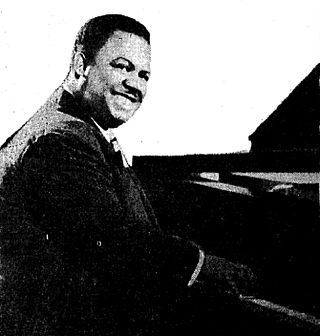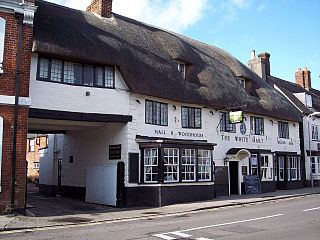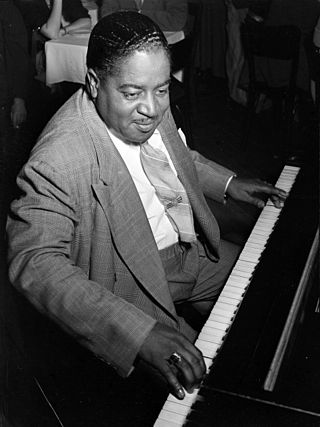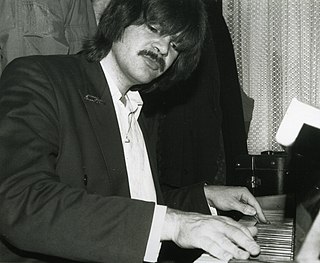
The Hawaiian Islands are an archipelago of eight major islands, several atolls, and numerous smaller islets in the North Pacific Ocean, extending some 1,500 miles from the island of Hawaiʻi in the south to northernmost Kure Atoll. Formerly the group was known to Europeans and Americans as the Sandwich Islands, a name that James Cook chose in honor of the 4th Earl of Sandwich, the then First Lord of the Admiralty. Cook came across the islands by chance when crossing the Pacific Ocean on his Third Voyage in 1778, on board HMS Resolution; he was later killed on the islands on a return visit. The contemporary name of the islands, dating from the 1840s, is derived from the name of the largest island, Hawaiʻi Island.
Boogie-woogie is a genre of blues music that became popular during the late 1920s, developed in African-American communities since 1870s. It was eventually extended from piano, to piano duo and trio, guitar, big band, country and western music, and gospel. While standard blues traditionally expresses a variety of emotions, boogie-woogie is mainly associated with dancing. The genre had a significant influence on rhythm and blues and rock and roll.
Jump blues is an up-tempo style of blues, usually played by small groups and featuring horn instruments. It was popular in the 1940s and was a precursor of rhythm and blues and rock and roll. Appreciation of jump blues was renewed in the 1990s as part of the swing revival.

Anderson Meade Lewis, known as Meade Lux Lewis, was an American pianist and composer, remembered for his playing in the boogie-woogie style. His best-known work, "Honky Tonk Train Blues", has been recorded by many artists.

Lou Donaldson is an American retired jazz alto saxophonist. He is best known for his soulful, bluesy approach to playing the alto saxophone, although in his formative years he was, as many were of the bebop era, heavily influenced by Charlie Parker.

Sturminster Newton is a town and civil parish in the Blackmore Vale area of Dorset, England. It is situated on a low limestone ridge in a meander of the River Stour. The town is at the centre of a large dairy agriculture region, around which the town's economy is built. The larger part of the town (Sturminster) lies on the north side of the river, and includes most shops and services, whilst to the south is the smaller Newton. Between these two areas is a wide flood plain. The town was the home of poet and author William Barnes, and, for part of his life, Thomas Hardy. The town has 43 shops, a primary and secondary school, and a school and college catering for children with Special educational needs. In the 2011 census the town's civil parish had a population of 5,234.

The music of Papua New Guinea has a long history.
The music of Solomon Islands has received international attention since before the country became independent from the United Kingdom in 1978.

Albert Clifton Ammons was an American pianist and player of boogie-woogie, a blues style popular from the late 1930s to the mid-1940s.

Pete Johnson was an American boogie-woogie and jazz pianist.
Clarence Smith, better known as Pinetop Smith or Pine Top Smith, was an American boogie-woogie style blues pianist. His hit tune "Pine Top's Boogie Woogie" featured rhythmic "breaks" that were an essential ingredient of ragtime music, but also a fundamental foreshadowing of rock & roll. The song was also the first known use of the term "boogie woogie" on a record, and cemented that term as the moniker for the genre.

Boogie-woogie is the term applied by the sport of competitive dance to a form of swing dance. Although the term derives from the boogie-woogie genre of music, the steps are most often danced to rock music of various kinds.

Joe Willie "Pinetop" Perkins was an American blues pianist. He played with some of the most influential blues and rock-and-roll performers of his time and received numerous honors, including a Grammy Lifetime Achievement Award and induction into the Blues Hall of Fame.
Boogie is a repetitive, swung note or shuffle rhythm, "groove" or pattern used in blues which was originally played on the piano in boogie-woogie music. The characteristic rhythm and feel of the boogie was then adapted to guitar, double bass, and other instruments. The earliest recorded boogie-woogie song was in 1916. By the 1930s, Swing bands such as Benny Goodman, Glenn Miller, Tommy Dorsey and Louis Jordan all had boogie hits. By the 1950s, boogie became incorporated into the emerging rockabilly and rock and roll styles. In the late 1980s and the early 1990s country bands released country boogies. Today, the term "boogie" usually refers to dancing to pop, disco, or rock music.

"Boogie Woogie Bugle Boy" is a World War II jump blues song written by Don Raye and Hughie Prince which was introduced by The Andrews Sisters in the Abbott and Costello comedy film, Buck Privates (1941). The Andrews Sisters' Decca recording reached number six on the U.S. pop singles chart in the spring of 1941 when the film was in release. The song is ranked No. 6 on Songs of the Century. Bette Midler's 1972 recording of the song also reached the top ten on the U.S. Billboard Hot 100.

Axel Zwingenberger is a German blues and boogie-woogie pianist and songwriter.

Boogie Woogie was an Indian dance competition television series created and directed by Naved Jaffrey, Ashu Jain and Ravi Behl for Sony Entertainment Television and Sony Entertainment Television Asia. Debuting in 1996, the show was judged by Indian film actor and Television host Javed Jaffrey who was the permanent judge, while his brother Naved, also the director and producer of the show, co hosted the show along with film actor Ravi Behl. The early episodes were shot in Mehta Industrial Estate in Andheri, Mumbai and later, was also shot at other film studios in Mumbai including Natraj, Filmalaya, Filmistaan, Famous, Film City among others. It is the oldest dance reality show on Indian TV and it has become the longest show in India. In the earlier seasons, the judges assigned various themes to episodes, including Bollywood, Horror, Friendship among others. It was also co-hosted by Kadambari Shantshri Desai in season 1 and 2.

Boogie Woogie Christmas is a 2002 Christmas album recorded by the Brian Setzer Orchestra.
Ralph is an unincorporated community in Tuscaloosa County, Alabama, United States. Ralph is located near U.S. Route 11 and U.S. Route 43, 16.4 miles (26.4 km) southwest of Tuscaloosa. Ralph has a post office with ZIP code 35480, which opened on March 3, 1900. Ralph was originally known as Hickman, in honor of the first postmaster, William P. Hickman. In 1900, the name was changed to Ralph, either for Ralph Stewart, the son of the postmaster at the time, or Kathleen Ralf Stewart, the wife of said postmaster.













